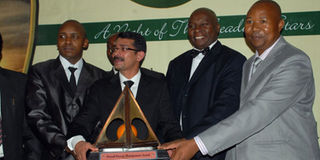Over 3,000 firms face energy audit

Kenafric Industries Limited General Manager Gopalan Uppilianpan (2nd left) assisted by his colleagues display their trophy after the company was declared overall winner during the Energy Management Award Gala 2013. New energy management regulations require commercial buildings consuming more than 180,000 KWH per year to carry out energy audits annually to optimise consumption. PHOTO/FILE
What you need to know:
- The Energy Regulatory Commission said Monday it would host a workshop at Strathmore Business School today to develop a curriculum that will be used to train auditors on the project.
- New energy management regulations require commercial buildings consuming more than 180,000 KWH per year to carry out energy audits annually to optimise consumption.
- Earlier this month, the regulator said it would penalise all institutions that exceed the threshold by imprisonment or a fine of up to Sh1 million.
More than 3,000 facilities across the country will be audited to determine their energy usage and efficiency initiatives as part of the government’s efforts to cut excess spending on power.
The Energy Regulatory Commission said Monday it would host a workshop at Strathmore Business School Tuesday to develop a curriculum that will be used to train auditors on the project.
“The Energy Regulatory Commission (ERC) is set to monitor of over 3,000 facilities to assess their energy usage and efficiency initiatives.
However, there is a shortage of energy auditors.
This workshop will lead to the development of the curriculum that will be used to train and license energy auditors,” read part of a statement by ERC.
The move is in line with the implementation of the Energy Management Regulations introduced last year to help the government curb wastage by imposing penalties on companies that are inefficient in power consumption.
Threshold
Earlier this month, the regulator said it would penalise all institutions that exceed the threshold by imprisonment or a fine of up to Sh1 million.
New energy management regulations require commercial buildings consuming more than 180,000 KWH per year to carry out energy audits annually to optimise consumption.
The audit reports are to be filed with the commission six months after the close of the companies’ annual financial year.
The rules also demand that large consumers of electricity install solar heating systems .
The campaign mainly targets industrial, commercial and institutional energy consumers which offer the highest potential for saving energy.
The regulations will affect institutions such as hotels, hospitals and schools and are likely to drive up demand for solar heating equipment.
ERC is also spearheading a fuel economy initiative together with the United Nations Environmental Programme (UNEP) that seeks to promote use of fuel efficient vehicles.
The programme was launched in August this year and will run for 15 months.
It will involve updating the vehicle inventory to establish the country’s average fuel economy which will inform development of policies to promote fuel efficient vehicles.
The programme is expected to help lower the country’s fuel import bill.
Inn 2012, the value of petroleum products imported into the country totalled Sh305.6 billion, accounting for 22 per cent of the value of the country’s total imports.
According to the Kenya National Bureau of Statistics, last year, the value of petroleum products imported into the country totalled Sh305.6 billion, accounting for 22 per cent of the value of the country’s total imports.
During the previous year, petroleum products’ imports were valued at Sh333.2 billion.





